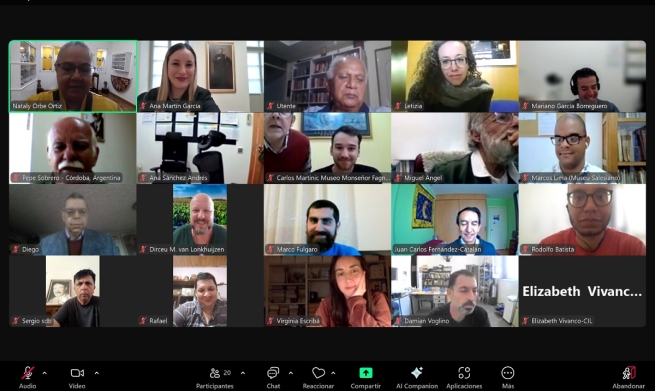Moderated by Nataly Orbe Ortiz from the Museo Abya-Yala (Abya Yala Museum by the Salesian Polytechnic University to preserve Amazonian culture) in the Ecuador Province (ECU), the event provided a platform for training, critical reflection, and learning about the principles and challenges in managing Salesian museums.
The session opened with a prayer led by Letizia Pecetto from the Ethnological Missionary Museum, part of the Special Circumscription of Piedmont and Aosta Valley (ICP), followed by greetings from Marco Fulgaro of the Missions Sector, who represented Fr. Reginaldo Cordeiro, absent due to his participation in the General Chapter of the Congregation.
Next, Ana Martín García, from the Museo Casa Don Bosco in Turin-Valdocco (ICP), introduced the members of the Advisory Team and outlined the group’s objectives.
A Key Moment: The Presentation of the Book Museums in Mission
One of the event’s most significant moments was the presentation of the book Museums in Mission, coordinated and edited by Fr. George Menamparampil, SDB, a former member of the Missions Sector. This publication brings together, for the first time, the voices of Salesian museum directors from around the world.
Fr. Menamparampil highlighted the extensive work and process behind the book’s creation, emphasizing a fundamental principle also promoted by the General Councillor for Missions, Fr. Alfred Maravilla: "A museum is not missionary simply because of the nature or type of collections it houses, but because of the purpose for which it was founded, the people who manage it, and the way its mission is carried out."
Defining Salesian Missionary Museums
Building on this theme, Dirceu Mauricio Van Lonkhuijzen, from the Museo delle Culture Don Bosco (Don Bosco Museum of culture) in the Brazil-Campo Grande Province (BCG), explored the International Council of Museums (ICOM) definition of a museum and how Salesian missionary museums should operate. He stressed that they must adhere to ethical principles and international standards, not only in management and conservation but also in research, communication, and education.
Ethical Principles and Museum Management
The discussion continued with Mariano García Borreguero from the Museo Misiones Salesianas in Madrid, part of the Spain–San James the Elder Province (SSM). He spoke about the ethical principles guiding Salesian museums, focusing on the specific roles and responsibilities of museum Directors.
Dr. García Borreguero emphasized the importance of integrity, transparency, and commitment in preserving the Congregation’s cultural heritage. He also highlighted that strong leadership and professional management are key to ensuring transparency, quality, and good practices in museum administration and conservation efforts.
Critical Reflections and Future Collaboration
Following the presentations, participants engaged in a rich discussion, expressing interest in:
-Understanding the current state of cultural heritage within the Congregation’s organizational structure
-Exploring collaboration opportunities among Salesian museums
-Establishing common guidelines for collection conservation
Commitment to the Future
The meeting concluded with a shared sense of enthusiasm and commitment, reinforcing the desire to continue networking and working together to address common challenges.
"Without a doubt, this meeting was an important step in strengthening connections among the professionals dedicated to preserving the cultural heritage of the Congregation’s museums. It also marked progress in advancing the educational mission that defines the Salesian Family," stated representatives from the Missions Sector.


